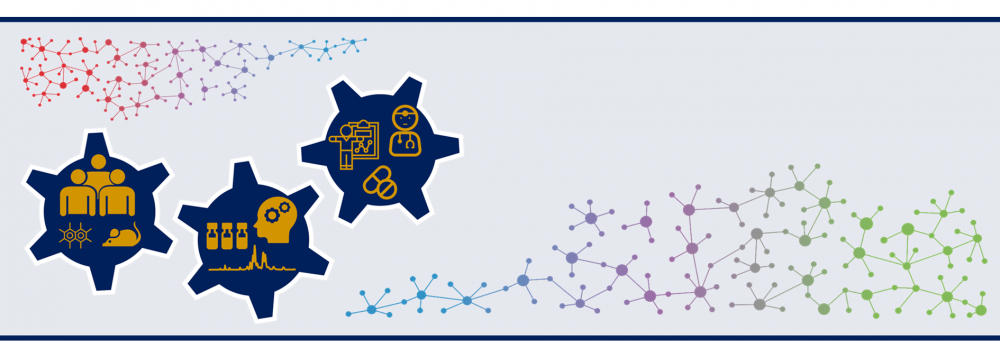Our research involves applying mass spectrometry-based techniques to perform metabolomic and proteomic analysis of various biological samples. We develop and use liquid chromatography and capillary electrophoresis–mass spectrometry-based (LC–MS, CE–MS) methods for in-depth characterization and quantification of complex lipids (lipidome), polar metabolites (metabolome), various exogenous compounds such as food components and drugs (exposome), and proteins (proteome). We also focus on improving data processing, automated data curation, statistical methods, and visualization of omics data.
We have successfully integrated LC–MS methods for targeted and untargeted analysis of lipids, polar metabolites, and exposome compounds (LIMeX) for diverse sample types and used them for studies focused on cardiovascular diseases, type 2 diabetes, lipogenesis, circadian rhythms, and drug adherence.
We have also investigated the proteome of human teeth and saliva, their link to tooth decay as well as proteins to tissue architecture at clubfoot and pulmonary hypertension. Posttranslational modifications of proteins are studied in connection to aging and disease of organism.
PhD Program 2022/2023 - Call for Applications
Liquid chromatography-mass spectrometry for comprehensive characterization of the metabolome and lipidome of biological samples
Over the last decade, mass spectrometry-based metabolomics and lipidomics have become established as the key platforms for comprehensive profiling of polar metabolites and complex lipids in biological samples (plasma, serum, urine, tissues). Coupling liquid chromatography to mass spectrometry (LC-MS) is the preferred technique in metabolomics and lipidomics permitting effective compound separations and detection. However, there is still a lack of sufficient data on the metabolome and lipidome characterizing biofluids and tissues which can be easily accessible and reused at any time for future studies. The Ph.D. project aims to focus on novel approaches for comprehensive characterization of the metabolome and lipidome in biological samples, specifically, (i) merging targeted and untargeted methods, (ii) increasing the coverage of spectral libraries used for metabolite annotation, and (iii) using bioinformatics tools for visualization and interpretation of the data obtained within metabolomics and lipidomics studies. The work will be conducted at the Institute of Physiology CAS and financially supported by various grants (GACR, MSMT, AZV).
Supervisor: T. Čajka (tomas.cajka@fgu.cas.cz)
Main topics
- Simple, fast, and robust protocols for metabolomics and proteomics projects
- Processing, curation, statistical analysis, and visualization of metabolomics data
- New separation methods (LC–MS, capillary electromigration techniques incl. CE–MS) for physiological research
- Metabolomics for studying circadian rhythms
- Metabolomics and proteomics for discovering new biomarkers of human health
- Predictive role of proteomic composition of teeth and saliva in the etiology of tooth decay
- Analysis of extracellular matrix disorders: from proteins to tissue architecture at idiopathic pes equinovarus
- Mechanisms of pulmonary arterial wall remodeling during pulmonary hypertension development
- Posttranslational modifications of proteins during aging and disease (e.g. diabetes mellitus)
Projects
Hydrogen-deuterium exchange mass spectrometry (HDX-MS) to identify unknown metabolites detected by untargeted metabolomics (21-00477S)
- PI: T. Cajka, Laboratory of Translational Metabolism
Identification of factors influencing adherence to pharmacotherapy in patients with type 2 diabetes using untargeted metabolomics (ENIGMA) (NU20-01-00186)
- PI: T. Cajka, Laboratory of Translational Metabolism
Metabolomics 2.0: Comprehensive analytical methods and bioinformatics tools for the study of circadian rhythms (LTAUSA19124)
- PI: T. Cajka, Laboratory of Translational Metabolism
Mapping of the rat circadian metabolome in brain and peripheral tissues during embryonic to postnatal development (20-21114S)
- PI: T. Cajka, Laboratory of Translational Metabolism
Role of adipose tissue metabolism in propensity to obesity: UCP1-independent mechanisms (19-02411S)
- Team member: T. Cajka, Laboratory of Translational Metabolism
- PI: J. Kopecky, Laboratory of Adipose Tissue Biology
The role of epicardial fat, subclinical inflammation and novel lipid signalling molecules in the onset and development of heart failure (NV19-02-00118)
- Team member: T. Cajka, Laboratory of Translational Metabolism
- PI: M. Haluzik, Institute of Clinical and Experimental Medicine, Prague; co-PI: O. Kuda, Laboratory of Metabolism of Bioactive Lipids
Changes of transcriptome during early postnatal development in humans: impact of premature birth on control of energy metabolism (NU20-07-00026)
- Team member: T. Cajka, Laboratory of Translational Metabolism
- PI: J. Kopecky, Laboratory of Adipose Tissue Biology
Bone marrow adipose tissue (BMAT) as a novel adipose depot in the regulation of the whole body metabolism and bone homeostasis (20-03899S)
- Team member: T. Cajka, Laboratory of Translational Metabolism
- PI: M. Tencerova, Laboratory of Molecular Physiology of Bone
Studying metabolic flexibility of bone marrow adipose tissue in obesity (EFSD/Novo Nordisk Foundation Future Leaders Award)
- Team member: T. Cajka, Laboratory of Translational Metabolism
- PI: M. Tencerova, Laboratory of Molecular Physiology of Bone
Affinity capillary electrokinetic methods for selective analysis of biopolymers and metabolites and for study of their interactions (20-03899S)
- co-PI: I. Miksik, Laboratory of Translational Metabolism
- PI: V. Kašička, Institute of Organic Chemistry and Biochemistry of the CAS, Prague
Bioartificial cardiovascular patches and vessels from porcine collagen reinforced with nano/microfibers using stem cells and dynamic culture (NV19-02-00068)
- Team member: A. Eckhardt, Laboratory of Translational Metabolism
- PI: J. Pirk, Institute for Clinical and Experimental Medicine, Prague

 Translational metabolism: Bridging the gap between research and medicine in metabolism
Translational metabolism: Bridging the gap between research and medicine in metabolism